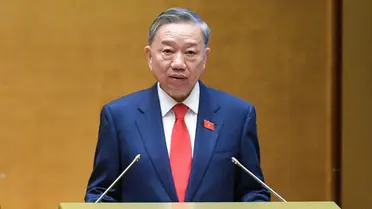
Vietnam designates a high-ranking law enforcement officer as the new president of the country
To Lam, Vietnam’s police minister, was voted as the state president by the parliament on Wednesday. Analysts view this as a strategic move, as it positions Lam to potentially pursue the role of chairman of the ruling Communist Party, which is the highest position in the country.
Lam’s election ensued the designation on Monday by Vietnam’s National Assembly of its new chairman, former deputy Tran Thanh Man, potentially culminating in a temporary resolution to two months of intensified political upheaval, which resulted in the departure of three out of Vietnam’s top five leaders due to unspecified misconduct.
Following standard protocols in the highly regulated single-party state, legislators unanimously voted on a resolution endorsing Lam’s election. This decision was made after a confidential vote, in which Lam was the sole candidate for the position. This occurred after he was nominated by the Communist Party last week.
Lam, aged 66, holds a significant position as the leader of the public security ministry. He has played a vital role in a comprehensive anti-corruption initiative, referred to as the “blazing furnace”, which aims to eradicate pervasive corruption. However, critics argue that this campaign has also been used as a means to marginalize political opponents during internal power struggles.
This is causing a decline in the country’s attractiveness to foreign investors, who have mostly decreased their holdings of equities in recent months, coinciding with negative political developments. Additionally, it is causing paralysis in the public administration, resulting in the non-utilization of billions of dollars in foreign aid and public expenditures.
Following his election, Lam informed lawmakers of his unwavering commitment to continuously combat corruption.
The state president’s job is primarily ceremonial, however it maintains significant importance as one of the country’s top four political offices, sometimes referred to as the ‘four pillars’. The remaining individuals include the party chief, the prime minister, and the parliament speaker.
Carl Thayer, an emeritus professor and Vietnam expert at the Australian Defense Force Academy in Canberra, predicts that political infighting would temporarily decrease following Lam’s election.
However, the decisive conflict still lies ahead, as the senior leader of the party, Nguyen Phu Trong, will conclude his third five-year term in 2026 – or potentially earlier if he resigns before his tenure officially ends.
“Thayer suggested that To Lam could leverage his position as one of the ‘four pillars’ to ascend to the role of general secretary, which refers to the position of party chief.”
“The elevation of To Lam to the office of president indicates that he has ambitions beyond retirement,” stated Florian Feyerabend, the representative of Germany’s Konrad Adenauer Foundation in Vietnam. Feyerabend highlighted that this position could serve as a “launch pad” for To Lam to secure the party chief position.
Feyerabend anticipated that there will be ongoing internal conflicts inside the system until the important post is filled, which he described as “the way the system operates.”
According to state media, the parliament also decided on Wednesday to remove Lam from his position as police minister, which was not initially planned.
According to a government decision quoted by online daily VietnamNet, Prime Minister Pham Minh Chinh has appointed Deputy Minister of Public Security Tran Quoc To, aged 62, as the temporary leader of the ministry.
Golden steak
Lam’s ascent has been accompanied with controversy.
In 2021, the renowned culinary artist Nusret Gokce, popularly referred to as “Salt Bae”, shared a video in which he personally served a gold-coated steak to Lam at his restaurant in London, coinciding with the COVID-19 lockdown in Vietnam. The video achieved widespread popularity until the Turkish chef took it down.
A noodle vendor, who subsequently uploaded a video mimicking the actions of “Salt Bae,” has been convicted of “anti-state propaganda” and sentenced to a term of five years in prison.
In 2017, Lam served as the leader of Vietnam’s public security ministry, at which time Vietnam’s security services reportedly conducted an extraordinary rendition of a Vietnamese company executive from Germany, with the assistance of Slovakia. The case significantly strained relations with both countries.
The 2023 report from the U.S. State Department regarding human rights in Vietnam has cautioned about notable transgressions carried out by security forces. The report specifically mentioned “credible accounts of security force members engaging in multiple instances of misconduct.”
All Categories
Recent Posts
Tags
+13162306000
zoneyetu@yahoo.com



